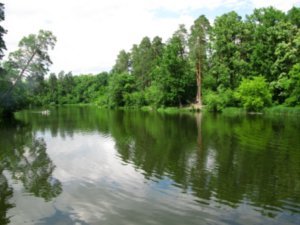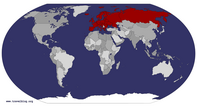Advertisement
Published: June 13th 2009

 Pushcha Voditsa
Pushcha Voditsa
Kyivska oblast'.Thinking of ways to spend my birthday, I remembered having read an article about the number 12 tram, whose route takes its passengers out of Kyiv and through a pine forest to a small town called Pushcha Voditsa. Exhausted by the city, desperate to explore somewhere beyond it, and intrigued by journey that the writer of the article described as
“one of the most remarkable tram journeys in the world”, Ana and I set off with a picnic of bottled water and bars of chocolate toward the tram stop in the Podil district.
We were leaving behind a hot summer day in Kyiv, the type on which its people seem at peace with the world: a tramp snoozes on a park bench in the shade of a chestnut tree; two young boys in cotton baseball caps share a bottle of Coke as they walk home from the swings; men with sunglasses on their heads and a bouquet of flowers in their hands hurry to meet their sweethearts; tourists file towards the Lavra monastery with chunky cameras bouncing on their chests; kids queue around the block for ice-cream from a kiosk; as we arrived on one of Podil’s squares, hundreds of

 Pushcha Voditsa
Pushcha Voditsa
Kyivska oblast'.white blossoms from poplar trees float through the air, like summer snow.
It wasn’t the village that had captured my imagination, but the tram ride to it.
Tramvaichiki are part of Eastern Europe’s identity, and a measure of how life here is lived - the richer the town, the newer and more comfortable the trams. In Yaroslavl - the first Russian town that I lived in, now more than three years ago - they rumbled and squeaked past my building before dawn every morning. The four hour
elektrichka ride from Tver to Moscow cost less than a cup of coffee and used to be my favourite way to clear my head. In Budapest I would take the tram from the stop near my hostel to the end of the line and back again, as it was the only way that I could travel across the city without getting lost. In Ukraine they wind through the streets on routes that are as unpredictable and old as the ladies and gentlemen who ride them.
The tannoy announcements on Ukrainian transport fascinate me. The man who calls out station names on the metro was so popular that during the week after

 Pushcha Voditsa
Pushcha Voditsa
Kyivska oblast'.his voice was replaced passengers turned to the strangers sat next to them to complain. He was soon brought back. The woman who reads out information at the train station has a voice so sexy that my legs go weak just from hearing her pronounce the names of industrial towns in Donetsk
oblast’. On the trams a deep, elderly man’s voice informs passengers which the next stop is - the static over the tannoy system distorts his voice so much that he sounds hostile. The strange, robotic sounds add to the intrigue of exploring a town in one of its tram carriages.
We pay our three
hryvnya fare and take our seats at the front of the red and yellow cabin - in expectation I wipe the dust off the window with a cloth and take my camera out of my bag, but for an hour the trip was anything but an adventure. We crawl along Podil’s
vulytsya Frunze and past the Spartak stadium, through the dirty, neglected outskirts of the city. The track only veers into the forest ten minutes before the end of the journey.
The charm of the route lies not in the scenery, but

 Pushcha Voditsa
Pushcha Voditsa
Kyivska oblast'.the novelty of its last few stops. I associate the shriek of tram breaks with attritional journeys early in the morning or late at night, through snowy streets in neighbourhoods lit by dull yellow street lights, of hurrying to hop on or off before the doors slam shut; travelling on one with the sun shining through the window - with trees on either side of the tracks, sometimes close enough for their leaves to scrape against the tram’s sides - sowed a disoriented excitement in my chest.
We step off the tram at the end of the line and choose one of five paths into the forest. If the way to Pushcha Voditsa isn’t as beautiful as I had let myself imagine, the park itself is splendid. The trees are so tall that they almost block the sun out - it shines onto the forest floor through dark leaves, so that the paths are bathed in a calm green light. Small birds flit from branch to branch overhead, and a cuckoo calls in the distance.
We arrive at a gap in the trees and find a wide, still lake, with a sturdy wooden bridge across it. Ukraine often

 Pushcha Voditsa
Pushcha Voditsa
Kyivska oblast'.disappoints, but it has more than its fair share of pleasant surprises - the trick is to expect less and appreciate more. With each breath of clean air I feel more like enjoying my birthday, and less like inviting the writer who had promised me
“a kind of Trans-Siberian tram” back to Pushcha Voditsa and shoving him in the water.
We stand on the bridge and survey the lake: a troupe of ducks paddle under the bride; fish flap at the surface of the water; a row of frogs relax on an old canoe in the shallows; a woodpecker darts over the water, as a heron glides in the opposite direction; an Alsatian enthusiastically swims after a thin log thrown into the lake by two children. All the creatures go about their business without a care in the world for what is going on around them.
The same is true of the people who have come to Pushcha Voditsa: Ukrainians are insular by nature and they relax in an insular way, travelling to popular places but seeming not to notice anything besides the people and things that they came with. I imagine how surprised families are to collect

 Pushcha Voditsa
Pushcha Voditsa
Kyivska oblast'.their photos after holidays in Crimea and find out that they weren’t the only people on the beach. At every clearing in the trees a family or group of friends had laid a blanket down and unpacked a picnic, or made a camp fire to cook
shashlyki over. Each group drowns out the sound of other people with pop music from their car, and tosses beer bottles into the water when they have emptied them. For all that, everyone is having a good time.
At the end of the lake is a sandy beach, where another Ukrainian holidaymaking rule is being observed: the older you are, the more clothes you put on to sunbathe. Naked toddlers splash at the edge of the water, children in swimming trunks swim until they are out of their depth; teenage girls sunbathe topless, with just one
hryvnya notes covering their nipples, fat men unbutton their shirts to the waist, and elderly couples lie on towels, fully dressed, enjoying the warmth in each others’ arms.
A six-aside game of volleyball is being contested in a cage on the beach. Quick-footed children scamper after the ball as it arrives over the net to divert

 Pushcha Voditsa
Pushcha Voditsa
Kyivska oblast'.it towards a team-mate, who then propels it as high in the air as he can, buying enough time for his team’s tallest player to look for an unguarded patch of sand on the other side of the net and slap the ball back over. Minutes pass without the ball touching the ground as players obediently keep to their positions - empty lungs and sore wrists are nothing to worry about when family pride is at stake.
We finish our walk around the lake, and an hour after we arrived we are back on the bridge again. A couple sit in the shade of it sipping
Obolon' beer and throwing pieces of bread to the ducks. Another couple float under the bridge in a canoe, sending ripples through the dark green water. With the sun now behind the trees the scene is even more tranquil than it was when we found it, until pair of lads in only their underpants appears from a thicket and throw themselves into the water.
We take a different path back to the entrance of the park, step onto the number 12 tram and go back to Podil, then home. In the evening

 Pushcha Voditsa
Pushcha Voditsa
Kyivska oblast'.we cut a cappuccino cake and curl up in front of the television, refreshed after a day in the countryside, relieved after a day away from the city.
My birthday doesn’t finish until I arrive at work the next day: each time I cross paths with a colleague I receive a warm handshake or a kiss on the cheek, and a little speech full of wishes for health and happiness. The eloquence of it all makes me blush. I tell them that I had been to Pushcha Voditsa with Ana for the day - Inna had been there at the weekend too, to sunbathe.
At the end of the day we congregate in the corridor outside my office, and I’m presented with a gift voucher and five roses. Like the lake at the end of the tram line, it wasn’t expected, but very welcome.
------------------------------
You can find more of my writing and photography on my journal,
Short stories and photographs from across Europe.
Advertisement
Tot: 0.135s; Tpl: 0.012s; cc: 14; qc: 37; dbt: 0.0468s; 1; m:domysql w:travelblog (10.17.0.13); sld: 1;
; mem: 1.2mb














Cat
non-member comment
Ah sounds like a perfect birthday :) Hope youre ok. xx